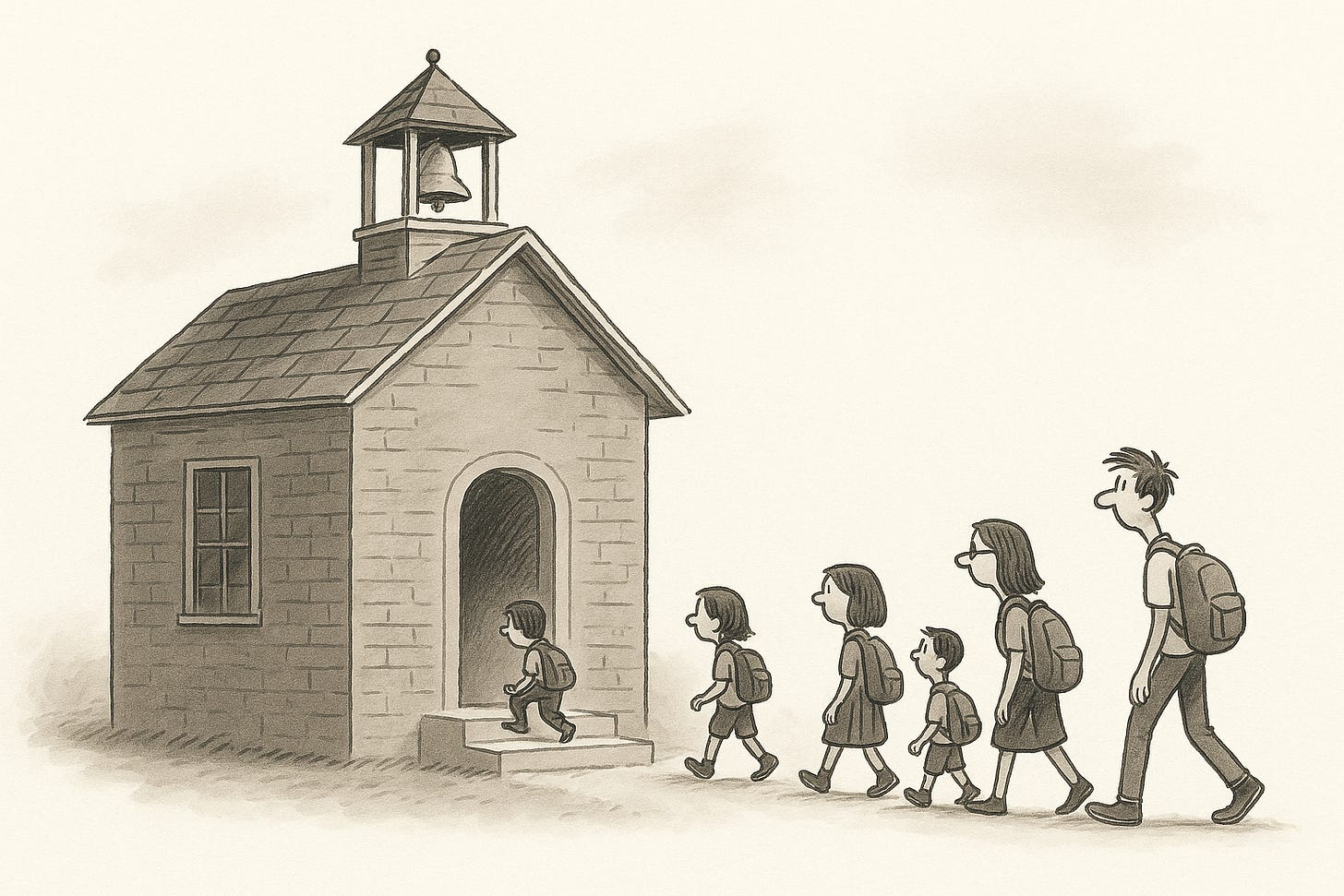I have a lot of thoughts on schools, as someone who has spent my entire conscious life constrained and enabled by them; I’m now a teacher, and I’m married to one. Today’s thought is simply to defend and reframe the ACX Non-book Review Contest Entry: School.
In sum, the author argues that “School isn’t designed to maximize learning. School is designed to maximize motivation.” By school, they mean mainly the mass of US public k-12 education.1
Keep in mind that this comes a week after another review of school—a specific new kind of school, Alpha School. Alpha School promises (and maybe succeeds?) to teach your kids super-fast, wall-clock time but also actually learning faster when they are learning.
The Zvi, whom I deeply respect and is one of the maybe dozen people I consume almost all of their writing, nicely reviewed the Alpha School review. But in it when he comments on the other review—the one that says schools are designed to maximize motivation—he makes a simple mistake. He quotes the School review and then says
That’s the case from the person who thinks school is designed properly? That’s what you want to do with childhood?
Burn. It. With. Fire.
I don’t mean to pick on Zvi especially; lots of people had similar reactions.2 The mistake is conflating an explanation of something’s function with a moral or aesthetic approval of the thing. You can explain something’s function and still want to improve it.
For school, the basic tension is this: most people think that schools can and should be improved because basically everyone introspectively realizes schools are not build to maximize their own specific goals. The Alpha School review is one way to improve them. Last year’s ACX review contest was won by another vision for new school. But if school’s function is maximizing the average (mean, median, or mode? idk) student’s motivation—this will not line up with your experience of school unless you are the average student. By simple reference class inference, the average reader of ACX, of The Zvi, or of the Hunch Box for that matter was not the average student.
Explaining something’s function is a valuable tool in the economist’s toolbox, associated with New Institutional Economics (NIE). As Richard Langlois lucidly describes it:
One observes a (perhaps puzzling) matrix of institutions in history and asks: what problem were these institutions solving? Rather than labeling puzzling behaviors as ignorant and inefficient (as historians once tended to do) or exclusively as mechanisms for oppressing the lower classes (as many still tend to do), the NIE attempts to explain such puzzles as responses to the costs, constraints, and scarcities the economic actors faced…
Rather than comparing actual (maybe puzzling) behavior against some imaginary frictionless standard, the NIE insists on comparing plausible institutional systems in real-world contexts rich in transaction (and other) costs. Explanation here consists in arguing that, and in detailing precisely how, the institutional system we observe is actually confronting some specified economic problem better than alternative candidates would have done. The hard part—the creative part—lies in discovering or imagining the right economic problem. What economic problem were they solving?
What problem is School solving? The review author claims that it is motivation for the average student. I agree that this is an unattractive objective function to be maximizing. But consider some other things school does.
Kids leave the house and are accounted for while parents can go to work as productive members of society.3
Read that first one again, it’s important.
Kids make friends.
Kids involve themselves in social hierarchies and learn how to climb them.
Kids are socialized into American society.
Those last three don’t really matter, read the first one again, it’s important.
In the abstract, we should subtract the value added from schools being schools over just childcare and then compare that value to the actual cost of childcare. Childcare is expensive and so that should be our lower bound on the value of school.
My point is: yes I am all for seeing schools do more actual education. But given the costs of doing the education—large—it is not currently worth it for school to do this. Whether school is maximizing average motivation or just providing childcare, it is executing a valuable function.
I say valuable function not because I like its aesthetics. I don’t. I’d like to think that my own teaching is a demonstrated deviation from this. Valuable, because the actual costs and benefits as calculated and generated by society by their actions reveal it as valuable.
But of course I want to improve it! I am a little skeptical, given what Arnold Kling calls the Null Hypothesis. But we should still try a lot of things, starting with vouchers, ability grouping (instead of age grouping), and of course stop subsidizing demand and restricting supply.
Oh and by designed they mean evolved.
The Alpha School review is 6 times more likely to win the contest at the time I write this.
Covid provided a nice experiment to test this.




